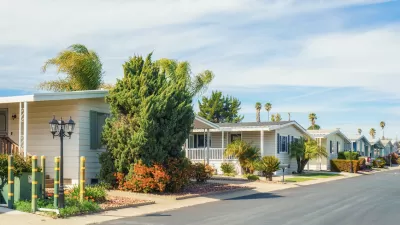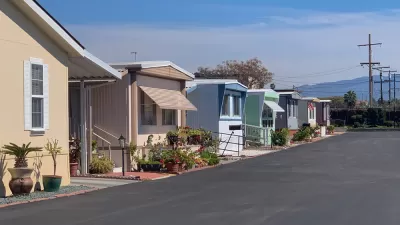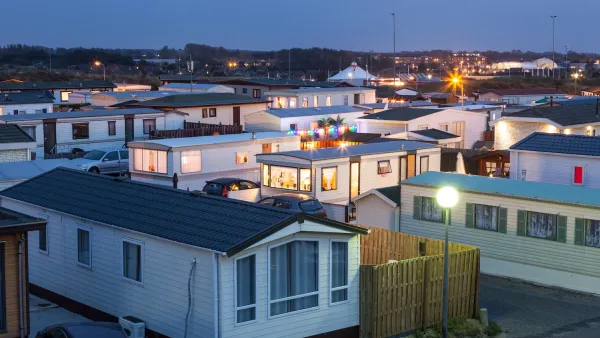Making it easier for mobile home park residents to collectively purchase the land they live on can protect their housing affordability for the long term.

“Because they don’t own the land beneath their homes, mobile home residents are at the mercy of the park’s owners, who could raise their rents or even shut down the park altogether as the land is redeveloped,” writes Kevin Hardy in Stateline. As more investors buy up mobile home parks, the resident ownership model is a key tool in the fight to keep this housing type affordable.
Coming together to buy one of these parks can be a daunting task for residents — but that could be changing. “Earlier this year, the federal government made available $225 million in grants for improvements at mobile home communities, including those owned by residents, and announced plans to allow resident-owned parks to access federally insured financing to keep rents low or make improvements.” These steps could pave the way for more cooperatively owned parks and protect residents from steep land rent hikes.
According to Hardy, “Currently, 22 states have laws requiring or encouraging owners of manufactured home parks to give homeowners the opportunity to purchase their land collectively. Those laws can vary wildly, with some requiring that the residents be given the right of first refusal, while others simply require park owners to provide notice of their intent to sell.” Some industry groups are pushing back, arguing that resident ownership is not always in the best interest of the residents.
Manufactured housing can cost as much as 45 percent less to build per square foot than site-built homes, making them an affordable option for lower-income households, but are often regulated out of neighborhoods largely due to unwarranted stigma. Now more states, including Maine and New Jersey, are enacting or strengthening laws aimed at encouraging collective ownership of mobile home parks and allowing manufactured housing in all residential neighborhoods.
FULL STORY: To save affordable housing, states promote resident-owned mobile home parks

Planetizen Federal Action Tracker
A weekly monitor of how Trump’s orders and actions are impacting planners and planning in America.

Chicago’s Ghost Rails
Just beneath the surface of the modern city lie the remnants of its expansive early 20th-century streetcar system.

San Antonio and Austin are Fusing Into one Massive Megaregion
The region spanning the two central Texas cities is growing fast, posing challenges for local infrastructure and water supplies.

Since Zion's Shuttles Went Electric “The Smog is Gone”
Visitors to Zion National Park can enjoy the canyon via the nation’s first fully electric park shuttle system.

Trump Distributing DOT Safety Funds at 1/10 Rate of Biden
Funds for Safe Streets and other transportation safety and equity programs are being held up by administrative reviews and conflicts with the Trump administration’s priorities.

German Cities Subsidize Taxis for Women Amid Wave of Violence
Free or low-cost taxi rides can help women navigate cities more safely, but critics say the programs don't address the root causes of violence against women.
Urban Design for Planners 1: Software Tools
This six-course series explores essential urban design concepts using open source software and equips planners with the tools they need to participate fully in the urban design process.
Planning for Universal Design
Learn the tools for implementing Universal Design in planning regulations.
planning NEXT
Appalachian Highlands Housing Partners
Mpact (founded as Rail~Volution)
City of Camden Redevelopment Agency
City of Astoria
City of Portland
City of Laramie





























